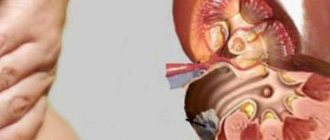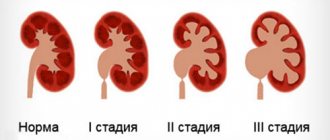Reception is strictly by appointment only!!!
Doctor Plus LLC License No. LO-77-01-004801
Registration at the clinic by phone
Make an appointment at the clinic
- +7 (495) 125-49-50
- Addresses of clinics in Moscow
- Daily
- call me back
Ultrasound of the bladder for pregnant women
must be done regularly. A pregnant woman's body is unique. During the period of bearing a child, he experiences many difficulties, both physically and emotionally. The most important thing during this period is to provide the necessary support for the mother's health so that the pregnancy process proceeds easily. This will require a number of appropriate procedures.
During pregnancy, the load on the mother's body increases significantly. First of all, the urinary system faces increasing stress, which leads to certain pathologies or worsens existing ones. During pregnancy, a woman experiences a sharp jump in hormonal levels, and the development of the fetus affects the healthy arrangement of the organs of the urinary system, which already works for two, because waste products of mother and child have to be removed. All this leads to the risk of various diseases.
Causes of urinary incontinence during pregnancy
During pregnancy, even healthy women can have problems with urinary control. The changes that occur in the body during this period become the source of a number of factors that provoke incontinence. More often, urinary control may deteriorate starting in the second or third trimester; less often, a woman may experience incontinence in the first months. It is important to understand that now there are many opportunities to go through this important period in a woman’s life with comfort, even if the problem of incontinence has not passed you by.
According to statistics, more than half of women experience varying degrees of incontinence during pregnancy. As time approaches the time of birth, the problem may worsen and persist, on average, for six months after the birth of the child.
Problems with urinary control may manifest as occasional dribbling. Typically, these episodes are associated with sudden stress - coughing, sneezing, laughing, lifting heavy objects, sudden changes in body position.
This problem significantly limits the freedom of movement of a pregnant woman and her ability to lead a socially active lifestyle. This is especially acute in the later stages. Expectant mothers feel awkward and worry that they cannot leave the house for a long time. In some cases, women may not have time to get to the toilet when they feel the urge. Such troubles in pregnant women can also happen at night.
But expectant mothers do not need to voluntarily expose themselves to social isolation. With the help of modern absorbent products, you can restore self-confidence and completely eliminate the discomfort associated with incontinence. Special urological pads will help you keep this delicate problem a secret. Having chosen the right size, depending on the absorbent characteristics, a woman can not worry and allow herself long walks and going out.
If you have a problem with urinary control during pregnancy, it is important to tell your doctor so they can help you make sure there is no pathological cause for the problem. You will need to take a urine test. If necessary, the doctor will prescribe other additional examinations.
If, according to the examination, health problems are excluded, then incontinence has exclusively physiological causes that are reversible and will disappear some time after childbirth.
The most common causes of urinary incontinence in pregnant women include:
• Significant increase in the size of the uterus.
The volume and weight of the organ increases with the growth of the fetus. The enlarged uterus gradually displaces neighboring organs and puts pressure on them, including the bladder. The amount of urine produced by the kidneys increases. As a result, the bladder becomes full faster. Due to constant pressure, its volume is limited, and the urge to urinate becomes more frequent. Urine leakage associated with this cause most often occurs in the third trimester.
• Loss of tone and overstretching of the pelvic floor muscles. This occurs not only against the background of the mechanical impact of the increasing mass of the fetus, but also under the influence of the hormone progesterone. As a result, it is more difficult for a woman to control urinary retention.
• Active movements of the child. When a baby, during a change in position in the uterus, hits the bladder with an arm or leg, this can lead to involuntary leakage of urine in the expectant mother.
• Initially decreased tone of the pelvic floor muscles. It occurs more often in women who have recently given birth, in mothers with many children, in pregnant women with poor physical fitness or significant excess weight.
• Stress incontinence. During periods of severe nervous tension, the conduction of nerve impulses and the regulation of urination may be disrupted. This type of incontinence occurs already in the first weeks of pregnancy. For rare episodes of small amounts of urine leaking, using a urological pad will be enough to make the woman feel free and confident again.
In addition to the main reasons listed, we can recall the factors influencing the severity of the problem. This includes fetal weight and amniotic fluid volume and multiple pregnancies. If a pregnant woman previously had inflammation of the urinary system, exacerbations may occur during pregnancy, which also provoke urinary incontinence.
Deterioration of urinary control is a source of discomfort and anxiety for women. But it is important to remember that if incontinence is caused only by physiological reasons, it does not pose a danger to the mother and the unborn child, since changes in the body associated with pregnancy are reversible. And iD LIGHT urological pads will help you maintain a feeling of comfort throughout the entire recovery period. The main thing for a pregnant woman is not to focus on worries about this - after giving birth, the problem will disappear by itself.
The need for diagnostics
An ultrasound examination will help make the correct diagnosis. Such diagnostics can reveal unpleasant diseases and anomalies. Ultrasound of the bladder for pregnant women
prescribed by a doctor when symptoms appear:
- frequent urination;
- manifestation of pain or burning during urination, as well as pain in the pelvic area;
- for any changes in urine analysis, as well as the appearance of blood in it;
- when urine color and odor change.
This diagnostic method is safe. It can be performed as many times as needed without fear of unwanted risks for the fetus or the expectant mother.
You can make an appointment with a doctor from our consultants by phone
Prices for services Addresses of clinics Video colposcopy Blood tests for PSA Cystostomy Calling a urologist to your home
Features of ICD in pregnant women
If pregnancy is planned, the doctor conducting a preliminary examination of the expectant mother will definitely check for the presence of kidney stones and offer to remove them, provided that the stones are large or located in a dangerous zone. In other cases, drug treatment is prescribed, aimed at dissolving and removing stones from the body naturally.
If the problem was discovered during pregnancy, the situation is more complicated. Most often, urolithiasis is detected due to changes in urine tests on ultrasound or when pain occurs in the lumbar region. If a kidney stone gets into the ureter, the woman suffers severe pain. The patient experiences the urge to urinate and the feeling of a full bladder very often.
Urolithiasis in pregnant women is especially dangerous in the early stages
The main feature of urolithiasis in pregnant women is that it is often very difficult for doctors to make a correct diagnosis and begin treatment without the use of x-rays. If there were no kidney stones before pregnancy, but during pregnancy the kidney increased in size, then there may be two reasons for this condition:
- In the early stages of pregnancy, due to significant changes in metabolism in the body, a stone may form in the kidney. In the later stages, in the third trimester, general changes occur in the body. Ligaments, tissues, organs become more extensible, the woman’s body prepares for the passage of the baby through the birth canal. Against this background, an enlargement of the kidney may well occur, and a stone from the kidney may enter the ureter through the dilated urinary tract. Without x-rays, it is almost impossible to determine this condition.
- A large fetus in the later stages, when turned head down, can slightly compress part of the ureter, which will lead to an increase in the kidneys in size.
When diagnosing, it is very difficult to determine the cause of the deterioration in the outflow of fluid: these are the consequences of the baby moving in the stomach or the movement of a stone along the ureter.
Both conditions can only be determined with an x-ray, since ultrasound does not “see” some parts of the ureter during pregnancy. In case of inflammation that does not go away, or a significant deterioration in the patient’s condition, sometimes doctors decide to take one x-ray, but only in the later stages, when the fetus is already fully formed.
Cystoscopy will also help in determining an accurate diagnosis. This test will not harm the fetus and will show whether there is inflammation in the bladder and whether there is a sufficient flow of urine.
Preparation
In order for the research results to be reliable, complete, and accurate, it is necessary to follow a number of recommendations:
- firstly, it is necessary to completely eliminate products that contribute to gas formation, because this will not allow you to get an accurate picture of what is happening in the body of the expectant mother;
- secondly, a few hours before the test you need to drink several glasses of water and try not to go to the toilet.
The principle of diagnosis in pregnant women remains the same as in ordinary patients. All jewelry will need to be removed as it may distort the results. Next, the subject takes a lying position, a special gel is applied to her, then the doctor moves the sensor over the abdomen.
During the ultrasound procedure, the contours and thickness of the walls, the location and size of the organ, the volume of residual urine and much more are recorded. Based on the information displayed on the monitor screen, the specialist takes measurements and records the results, after which a final diagnosis and recommendations are made.
Prices for ultrasound
some of the most adequate in the city. Your family's budget will not be affected.
Why are kidney stones dangerous for the fetus and for the woman?
If inflammation occurs in the kidneys, it must be removed. It can give unpleasant complications in the form of:
- disturbances in the blood supply to the fetus;
- oxygen starvation of the fetus;
- premature birth.
The thing is that when a stone moves or an organ becomes inflamed, renal colic occurs. Doctors believe that this is one of the most painful conditions that a person experiences. Renal colic is so unpleasant that it causes quite a strong spasm in the pregnant woman’s body. But it can also be caused by any of the above consequences.
Urolithiasis is also dangerous because its attacks are quite difficult to stop during pregnancy. A pregnant woman is not treated with strong medications and many modern methods, such as shock waves, as this can cause irreparable harm to the fetus.
Typically, patients are prescribed decoctions, tinctures of medicinal herbs, and mild diuretics. If this does not help, then more serious medications are administered.
ICD is treated in pregnant women with decoctions and tinctures of medicinal herbs
Is this procedure really necessary?
Ultrasound of the bladder for pregnant women
an important procedure, as it makes it possible to verify the health of the expectant mother and child.
For a relatively low price you get qualified personnel and state-of-the-art equipment. Children are the most precious thing in our lives and we will take care of you and your future baby.
| Prices for admission to Moscow | |
| Initial appointment | 900 rubles |
| Repeated appointment | 700 rubles |
| Ultrasound of the prostate | 1,200 rubles |
| Calling a doctor to your home | 1,500 rubles |
| Pelvic ultrasound | 1200 rubles |
This article does not constitute medical advice and should not serve as a substitute for consultation with a physician.
Can I take antibiotics?
Almost all antibiotics that are usually prescribed for the treatment of pyelonephritis are strictly prohibited during pregnancy. Prescribing antibiotics is possible and necessary for inflammation of the kidney (pyelonephritis) or bladder (cystitis), but this is a very limited list of drugs, primarily drugs from the penicillin group. They try not to make their names public so that patients do not self-medicate. During this period, not only the correct drug is important, but also the correct dosage and time of taking the medication.
For spasms, doctors prescribe painkillers to patients.
When is surgery necessary?
In critical cases, if a stone supports the inflammatory process in the kidney and it cannot be stopped with medication, they resort to installing a catheter between the kidney and the bladder (stent), which allows urine to flow freely from the kidney, bypassing the stone. If this does not help, then surgical removal of the kidney stone is prescribed. This is done in order to prevent purulent inflammation. The treatment process must necessarily be carried out in a medical institution that is fully equipped with modern equipment, with a good intensive care unit and staff with specialization in this field.
To avoid problems when treating urolithiasis during a planned pregnancy, it is worth visiting a urologist before conception and checking the condition of the kidneys.











